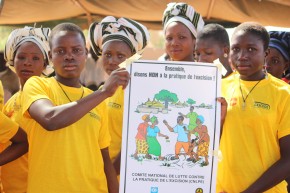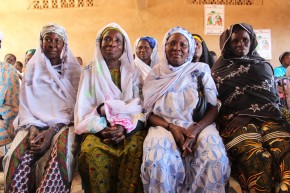Today I am in Ziniaré, a village that has abandoned female genital mutilation or cutting (FGM/C).
While 76% of girls and women from 15 to 49 years old in Burkina Faso have undergone the practice, only 9% of Burkinabés, men and boys included, think it should continue.
So, what is working here?
Sometimes people see for themselves the terrible harm FGM/C can do. In Ziniaré I met Naba Siguiri, a customary chief who lost his 5 year-old daughter when her cutting went wrong. Siguiri has become an important voice in the fight to eradicate the practice in his village.
But where people don’t have a personal experience of the damage FGM/C can do, including complications in childbirth, other methods are needed to shift people’s opinions.

Here in Burkina Faso the government has an action plan that includes a huge communications and sensitisation effort. Community members are trained to educate their peers and across the village there are posters to remind people of the reasons they have committed to abandon the practice.
In Ziniaré I met Savadogo Jean, Zongo-Savadogo Fati and their daughter Savadogo Awa, they were 1 of the first families in the village to announce that they would not cut their daughter. The community was shocked by the decision at first, but as they learnt about the potential health impacts of FGM/C they began to accept their decision, and in the end congratulated their bravery.
Then there are the prosecutions. Burkina Faso has 1 of the most effective and well enforced laws against FGM/C in the world. 117 cases of excision were reported and 192 people were convicted between 2009 and 2013. Police and magistrates also patrol villages to give help and advice to villages and victims and investigate, prosecute and adjudicate on potential or actual cases. The officers I met are passionate about their work and also staff a hotline that people can call anonymously to report cuttings that are about to happen or have recently taken place. I heard many stories of cuttings the police were able to prevent, or victims they were able to help.
I also met an ex-cutter, Abzeta Kabore, an elder woman who used to perform FGM/C. Traditional practitioners undertake more than 95% of excisions here in Burkina Faso, often with knives or razors and with limited medical supplies. Kabore was prosecuted and spent time in prison, though she says that it was not the punishment alone that made her renounce her former livelihood. In prison she learnt about the negative health impacts of FGM/C and on her return to the village she refused further requests for girls to be cut.

DFID supports all of the people I met today and the Burkinabé government, through the largest ever donor programme on FGM/C which backs the African-led fight to eradicate the practice.
But challenges remain here. The government has so far focused on 2 high-prevalence provinces as they do not have the resources to cover the whole country just yet.
So we need to step up to the challenge. I’m calling on the international community to break the silence on this issue, and to raise their voices against this harmful practice.
I learnt today that we can only do this if everyone – the international community, parliamentarians, customary and religious leaders, communities themselves and even those who perform the practice – work together. Let’s do that, and let’s end FGM/C within a generation.
------------------------------------------------------------------------------
Read my previous post from Burkina Faso:
Voice, choice and control: Tackling FGM in Burkina Faso
Find out what the British government is doing to eliminate female genital mutilation.

2 comments
Comment by JOSH SYKES posted on
Hi Lynne
Just wondering where the "9% of Burkinabés, men and boys included, think it should continue" came from?
Thanks and best wishes
Josh
Comment by FGM event at the UN Commission on the Status of Women | Lynne Featherstone posted on
[...] on the Status of Women did the job. I was speaking alongside the First Lady of Burkina Faso, who I met on my recent visit there, ministers from Italy and Somalia, the head of UNESCO, NGOs and, most importantly, young people [...]